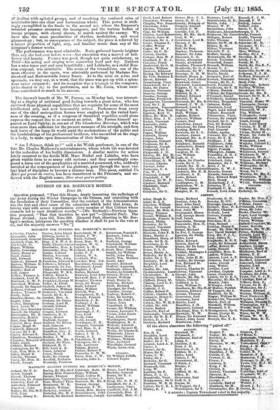' j ff Quarts.
The Etoile du Nord has now been brought before the English public- under Meyerbeer's own superintendence, and in a manner worthy of him and of his work. Its first performance at Covent Garden, on Thursday, is a notable event in our musical annals, as much as the production of Ro- bert is Diable, the Huguenots, and the Prophite. The Etats du Nord,. though written, like them, for the French stage, yet belongs to a different class and was intended for a different theatre. It is called by its author a comic opera, and is performed at Paris, not at the Academie, but at the Opera Comique. Hence it was not subjected to the laws of the grand serious opera ; the bulk of the dialogue in which the action is carried on being simply spoken, instead of being delivered in recitative. This has caused much difficulty in its adaptation to the Italian musical stage, on which spoken dialogue has never been heard, from the birth of opera to the present day. It has been necessary, in consequence, for the Italian librettist to convert the French prose into Italian verse ; which the com- poser himself has clothed with elaborate recitatives accompanied by the full orchestra. The dramatic effect is decidedly bad. The action of the drama is rendered heavy and slow ; and Scribe's lively and spirituel talk is ill exchanged for bald Italian phrases mixed up with the sound of in- struments.
The opera is essentially comic, though its tone is varied and elevated by admixture of the heroic and romantic elements. Even the hero and heroine, Peter the Great and his future Empress, are comic characters. Three supposed periods of their lives are taken, fur Scribe's incidents are wholly imaginary. At first, Peter is a young carpenter in a Finland dockyard, and Catherine is a village-girl who supplies the workmen with food and drink. They are lovers; but Catherine is ambitious, and desires that Peter should gain honour in arms. They part accordingly ; Peter because his army requires his presence ; and Catherine, in the disguise of a young recruit, follows her lover to the wars. Next we have Peter with his army, but known only as a captain ; and Catherine serving as a soldier in the ranks. She is posted as sentinel on a tent in which two officers are carousing; in one of them she is astonished to recognize her old lover, and is scandalized to see that a couple of vivandieres are of the party. While she is watching them, she is challenged by her corporal— they quarrel, and she strikes him. The corporal complains; and Peter, drunk by this time, orders the culprit to be shot. She is marched off accordingly, when Peter struck by sudden remembrance, is sobered in an instant, and wildly calls to have her brought back. But she has es- caped. While Peter is overwhelmed by this intelligence, a rebellious conspiracy breaks out. He quells it by revealing himself—the insurgents submit—and the Czar leads his troops against the enemy. Lastly, Peter is in his palace, buried in melancholy for the loss of Catherine. She, wounded in her attempt to escape, has found refuge in a peasant's cot- tage. She is discovered, but bereft of reason ; which is restored by the Emperor's device of =rounding her with the reminiscences of former days of love and happiness. The conclusion is the Czar's announcement that Catherine is his Empress. Their fortunes are mixed up with those of a pleasing pair,—George, Catherine's brother, and his rustic sweet- heart, Praseovia and of Danilowits, a pastrycook, who becomes Peter's confidant and chief favourite. There are here ample materials both se- rious and comic, which-Scribe has used with his usual skill. In the music we recognize the author of the Huguenots and the Pro- ' plate ; the same power of construction and combination, the same faculty df 'dealing with agitated groups, and of resolving the confused cries of 'multitudes into one clear and harmonious whole. This power is strik- ingly exemplified in the finale to the second act, where the Emperor's revealed presence overawes the insurgents, and the various bodies of troops prepare, with choral shouts, to march against the enemy. We have also the same peculiarities of rhythm, modulation, and vocal phraseology ; but, in consequence of the subject, the piece is relieved by a larger proportion of light, airy, and familiar music than any of the composer's former works. The performance was most admirable. Bosio gathered laurels brighter than any she had ever before worn—her execution was a marvel of bril- liancy and beauty. Formes was good, though not quite satisfactory, as Peter—his acting and singing were somewhat hard and dry. Gardoni has a nice tenor part and sang beautifully ; and Lablache, as a stolid Rus- sian corporal, was inimitable. The scene of the vivandieres, one of the most effective in the opera, was admirably performed by Madame Ru- dersdorff and Mademoiselle Jenny Bauer. As to the miss en scene and spectacle, we may say, in a word, that the piece was got-up with a splen- dour never surpassed ; and its reception was a triumph to the composer, who shared in it,) to the performers, and to Mr. Costa, whose exer- tions contributed so much to its success.



























 Previous page
Previous page